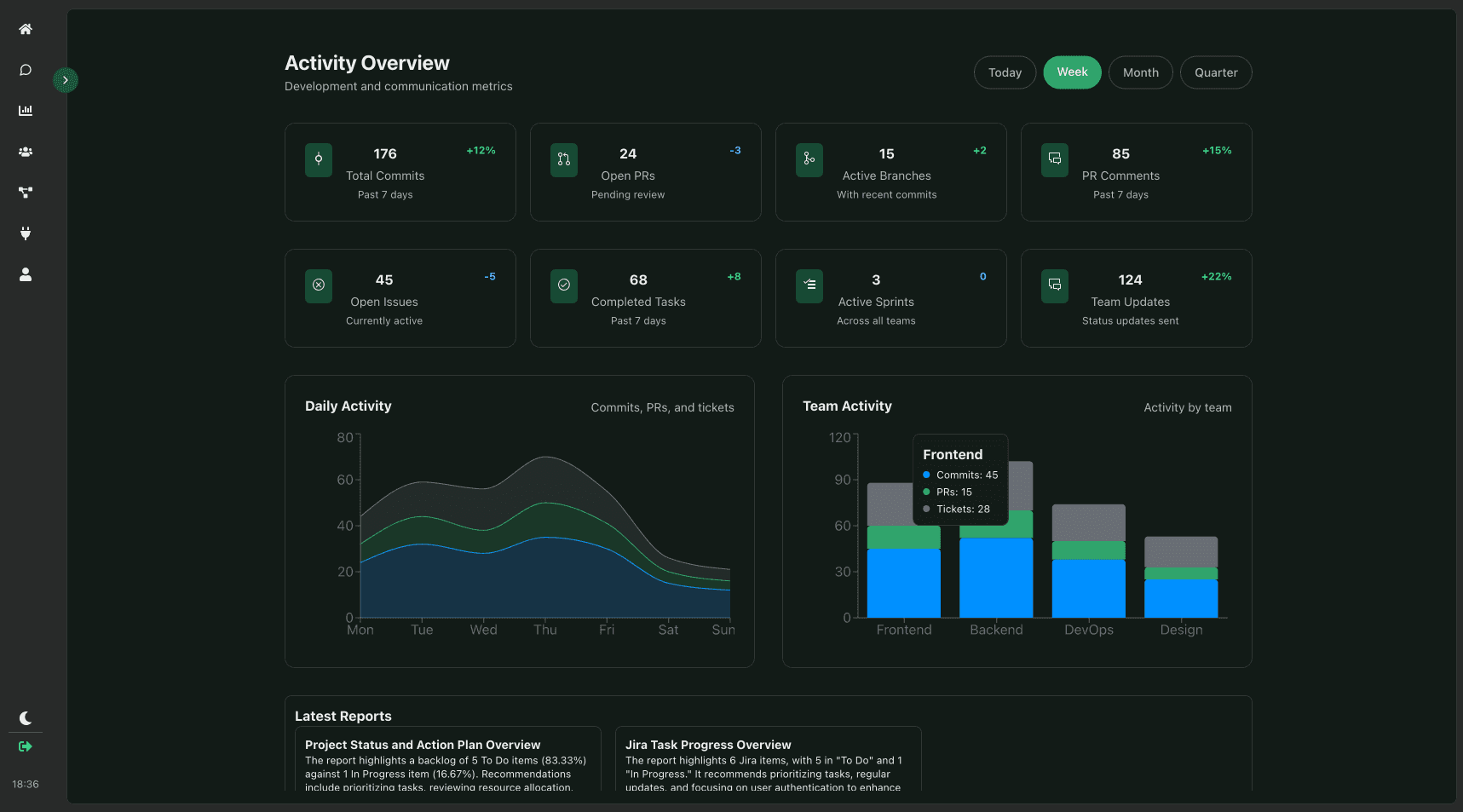11/10/2024
Development Without Disruption: How Juniper Eliminates Status Report Overhead
In the world of software development, flow state is precious. That moment when a developer is fully immersed in solving a complex problem, when code flows naturally and insights emerge organically – this is when true innovation happens. Yet this valuable state is constantly interrupted by the necessity of status reporting, progress updates, and administrative documentation.
The Hidden Cost of Administrative Context Switching
Recent studies have revealed the staggering impact of context switching on development teams. When developers are forced to switch between coding and status reporting, the cost isn't just the time spent writing updates – it's the massive productivity tax imposed by mental context shifts. Research shows it takes an average of 23 minutes and 15 seconds to fully regain focus after a distraction, with context switching resulting in up to 40% loss in productivity. For a typical development team, this translates to approximately 780 hours lost per team member annually, just to task switching.
The cognitive burden is equally concerning. When developers switch from coding to status reporting, they experience what researchers call "attention residue" – part of their mind remains stuck on the previous task, making it impossible to fully focus on the new one. This cognitive drain manifests as impaired problem-solving abilities, reduced creative thinking, and increased mental fatigue. For developers deep in complex technical problems, this context switching isn't just inconvenient – it's devastating to productivity and code quality.
Juniper: Eliminating the Status Report Tax
Our new Activity Overview dashboard represents a fundamental shift in how development progress is communicated. By deeply integrating with your existing tools – GitHub, Linear, and Jira – we've eliminated the need for context switching while ensuring comprehensive progress tracking. Instead of requiring developers to manually compile and report their progress, Juniper silently monitors development activities in the background, tracking everything from code commits and pull requests to issue status and sprint progress across your preferred platforms.
This automation preserves precious mental resources. Consider that the brain uses 20% of our body's energy despite being only 2% of our body's weight. By eliminating unnecessary context switching, developers can maintain peak cognitive performance throughout their day, focusing their mental energy on solving complex technical challenges rather than administrative tasks.
Beyond Basic Metrics: Contextual Intelligence
Juniper doesn't just track metrics – it understands the relationships between different types of development activities and automatically creates meaningful narratives for stakeholders. Our system maintains the historical context of development decisions, tracks relationships between work items, and identifies dependencies and bottlenecks without requiring manual intervention, whether your team uses Linear for its modern project management approach, Jira for its enterprise capabilities, or a combination of tools.
Rather than requiring teams to manually analyze and report on their progress, Juniper proactively identifies emerging patterns in development workflows, detects potential issues before they impact delivery, and highlights successful practices that can be replicated across teams. This intelligent analysis ensures that stakeholders stay informed without developers having to context switch from their primary work.
The Business Impact of Eliminated Context Switching
The benefits of automated status reporting extend far beyond individual productivity. Organizations implementing automated progress tracking see significant improvements in workflow efficiency, team collaboration, and project success rates. With developers typically spending 36 minutes per day just switching between tasks, automated status reporting can reclaim hundreds of hours of productive time per team member annually.
More importantly, this recovered time isn't just about quantity – it's about quality. When developers can maintain extended periods of focused work, they produce better code, solve problems more creatively, and experience significantly less burnout. The reduction in context switching creates a virtuous cycle where improved focus leads to better solutions, which in turn leads to fewer issues and interruptions.
Building for the Future of Development
As development practices continue to evolve, we're seeing increased focus on developer experience and cognitive load management. The complexity of modern development ecosystems demands tools that support sustained focus and minimize unnecessary context switching. Juniper's vision is to eliminate the cognitive burden of status reporting while providing comprehensive visibility into development progress.
We believe the future of development lies in tools that work silently in the background, gathering and synthesizing information without requiring developer attention. By automating the collection and distribution of progress updates, we free developers to focus on what they do best – solving complex technical challenges and building innovative solutions.
Take the Next Step
Ready to eliminate the productivity tax of status reporting? Join the Juniper waitlist to be among the first teams to reclaim hundreds of hours of productive time while improving development focus, code quality, and project success rates. The future of development is about building great software, not writing status reports.


